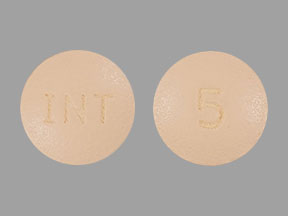Ocaliva and Alcohol/Food Interactions
There are 2 alcohol/food/lifestyle interactions with Ocaliva (obeticholic acid).
Caffeine Obeticholic Acid
Moderate Drug Interaction
MONITOR: Coadministration with obeticholic acid may increase the plasma concentrations of drugs that are substrates of the CYP450 1A2 isoenzyme. The mechanism is decreased clearance due to inhibition of CYP450 1A2 activity by obeticholic acid and its glycine and taurine conjugates. When a single 200 mg dose of caffeine (a probe CYP450 1A2 substrate) was administered with obeticholic acid 10 mg once daily, caffeine peak plasma concentration (Cmax) and systemic exposure (AUC) increased by 6% and 42%, respectively.
MANAGEMENT: Caution is advised when obeticholic acid is prescribed with drugs that undergo metabolism by CYP450 1A2, particularly those with a narrow therapeutic range such as theophylline or tizanidine. Dosage adjustments as well as clinical and laboratory monitoring may be appropriate for some drugs whenever obeticholic acid is added to or withdrawn from therapy.
References (1)
- (2016) "Product Information. Ocaliva (obeticholic acid)." Intercept Pharmaceuticals, Inc.
Switch to consumer interaction data
Obeticholic Acid High Cholesterol (Hyperlipoproteinemia, Hypertriglyceridemia, Sitosterolemia)
Moderate Potential Hazard, Moderate plausibility
obeticholic acid - lipids disorder
Patients with primary biliary cholangitis generally exhibit hyperlipidemia characterized by a significant elevation in total cholesterol primarily due to increased levels of high-density lipoprotein-cholesterol (HDL-C). Exercise care when using obeticholic acid in patients with lipids disorder. It is recommended to monitor patients for changes in serum lipid levels during treatment with obeticholic acid. For patients who do not respond to treatment after 1 year at the highest recommended dosage that can be tolerated (maximum of 10 mg once daily), and who experience a reduction in HDL-C, weigh the potential risks against the benefits of continuing treatment.
References (1)
- (2016) "Product Information. Ocaliva (obeticholic acid)." Intercept Pharmaceuticals, Inc.
Switch to consumer interaction data
Ocaliva drug interactions
There are 64 drug interactions with Ocaliva (obeticholic acid).
Ocaliva disease interactions
There are 3 disease interactions with Ocaliva (obeticholic acid) which include:
More about Ocaliva (obeticholic acid)
- Ocaliva consumer information
- Check interactions
- Compare alternatives
- Pricing & coupons
- Reviews (3)
- Drug images
- Latest FDA alerts (4)
- Side effects
- Dosage information
- During pregnancy
- FDA approval history
- Drug class: miscellaneous GI agents
- En español
Related treatment guides
Drug Interaction Classification
| Highly clinically significant. Avoid combinations; the risk of the interaction outweighs the benefit. | |
| Moderately clinically significant. Usually avoid combinations; use it only under special circumstances. | |
| Minimally clinically significant. Minimize risk; assess risk and consider an alternative drug, take steps to circumvent the interaction risk and/or institute a monitoring plan. | |
| No interaction information available. |
See also:
Further information
Always consult your healthcare provider to ensure the information displayed on this page applies to your personal circumstances.


